|
When a company like Eureka! packages two films together in a single release, you can be sure there they are specifically connected in some way. They may share the same director or lead actor, be linked by their subject matter or the studio that produced them, or one may be a direct sequel to another. In the case of 1987 Hong Kong double of Rich and Famous [Gong woo ching] and Tragic Hero [Ying hung ho hon] it's every one of these, but the bond between them is even stronger than that. Both were released within months of each other and were originally intended as a single feature, but were split into two when it was deemed that the resulting work would be too long for a Hong Kong film of the day. Thus producers (Johnny Mak Productions, Golden Harvest and Win's Film Company) elected to release the first half with the promise of releasing its sequel a short while later. At least that's what logic would normally dictate, but that's not what happened here. With the early scenes focussed primarily on establishing the characters and their arcs, the decision was made to put that on hold and release the more action-oriented second half of the story as Tragic Hero instead. The film was a success, and not wanting to waste all of the unused footage, the decision was then made to shoot some extra scenes to bulk up the content, and four months later the first half of the story was released as a prequel, Rich and Famous, with Tragic Hero simultaneously re-released to allow patrons to watch them in whichever order they pleased.
I'll freely admit that I learned the above only after watching both films for the first time and diving into the special features, This means I saw the films in chronological order rather than how they were first released, but I'd humbly suggest this is how they should be now seen, as individual character arcs that play out and conclude in the second half definitely have more impact if you've spent some time getting to know the characters first. This does present me with the usual problem when discussing a film and its sequel in the same review, as to go into any real detail on the second film potentially means spoiling plot points and even the ending of its predecessor. There thus may be spoiler warnings ahead and the chance to skip past paragraphs that may reveal too much to newcomers, but I will endeavour to keep these to a minimum here.
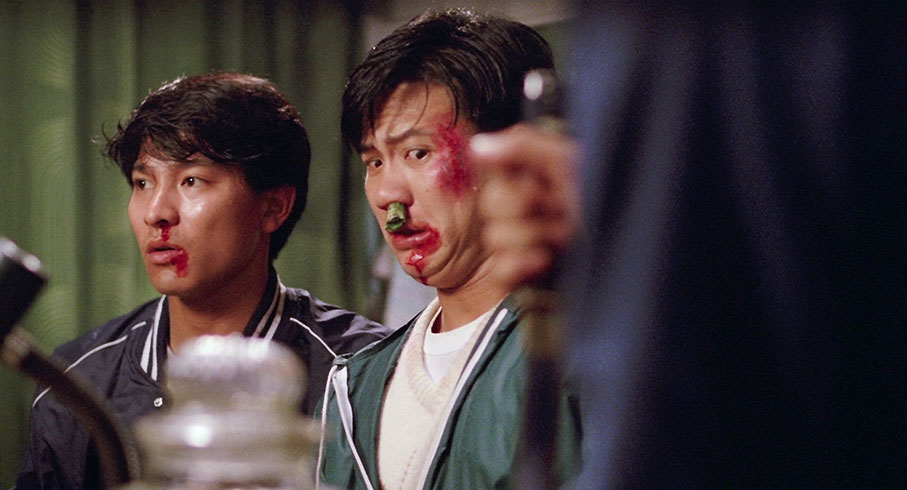
Let's start with Rich and Famous, which opens with a fact-based prologue that recalls how between 1949 and 1953, two million refugees fled to Hong Kong from mainland China, a free movement of people that was halted by a blockade agreed jointly by the governments of both territories. In 1953, shortly before the border was closed, single father Kit (Kwan Yeung) arrives in Hong Kong with his young son and daughter, Kar-yung and Wei-chiu, and is first seen searching for his old friend Lam Chiu-sang in a seriously cramped immigrant dormitory. To the surprise of seemingly no-one who lives there, Chiu-sang has died in the night, leaving his young son Ting-kwok fatherless and bewildered. A dismayed Kit thus adopts the boy who is immediately accepted by Kar-yung and Wei-chiu and raised by Kit as his own child.
Kit secures back-breaking work as a labourer, the pay for which secures the family a tiny apartment but sixteen years later has rendered him infirm, by when Kar-yung (Alex Man), Wei-chiu (Wong Siu-Fung) and Ting-kwok (Andy Lau) have grown to young adulthood. Kar-yung has developed a bit of a gambling problem, and when his latest wager goes south, he foolishly attempts to doctor his betting slip. This doesn't fool the gambling house staff for a second and they elect to teach him a violent lesson, and while he and the more level-headed Ting-kwok put up a good fight, they are ultimately defeated and hauled before the house manager, Uncle Ken (whether he is their actual uncle or 'uncle' is being used as a term of respect here I am not in a position to confirm either way). He points out that Kar-yung has racked up a debt of $1,200, and reveals that the punishment for forging betting slips involves cutting the fingers off of one of the transgressor's hands. To make it clear to Kar-yung that they're serious about this, Ken's henchman plonks a jar on the table in front of him containing the pickled fingers of previous would-be cheats. Yikes. Kar-yung is temporarily spared this fate by a heartfelt plea from Ting-kwok in which he outlines the family's current financial woes and their father's ill health. He also reveals that Wei-chiu has been forced to find work as a bar hostess, which appears to be only a couple of steps above prostitution. Why these two aren't out earning a crust instead is anybody's guess. Ken is impressed by Ting-kwok's loyalty to his family, but adds a series of expenses to the bill that ups the debt to over $9,000 and gives Kar-yung just ten days to pay it. He then unexpectedly hands Ting-kwok $200 to have a nice dinner with their dad, money that Kay-yung immediately insists on taking charge of.
With Kar-yung now needing to find eight times what he originally owed, he and Ting-kwok meet up with their friend Mak Ying-hung (Alan Tam), whose nervousness and stutter are regularly mocked by his workmates and have earned him the sarcastic nickname of 'Gutsy Ying'. Acting on information that Ying-hung tells them about the criminal gang that he works for, Kar-yung and Ting-kwok pull a dockside scam to steal money from a well-dressed trafficker, but instead of lying low with the cash they visit a travel agent with Wei-chiu to book themselves a holiday. Here they are spotted by the drug courier's bodyguard and relentlessly chased by his men, a pursuit that ends with Wei-chiu nursing a stab wound and Ting-kwok kidnapped and tortured by bald-headed gang boss Chu Lo-tai (Ko Chun-Hsiung). Despite her injury, Wei-chiu keeps a work appointment for the evening as one of the hostesses at a dinner being thrown by gang boss Lee Ah-chai (Chow Yun-fat) for his Thai friend and fellow gang leader, Fan Tit-tau (Fan Mei-sheng). On discovering that Wei-chu is injured, Ah-chai takes pity on her and listens to her story, and despite being advised against doing so by his aide, he decides to intervene and secure Ting-kwok's release, which Chu only reluctantly facilitates after torturing him some more. And yes, I'll have more to say about that in a minute. Ah-chai offers Ting-kwok and Kar-yung the chance to work for him after Ting-kwok recovers, a golden opportunity that both men accept. Four years later, the loyal and hard-working Ting-kwok has risen in the ranks to become one of Ah-chai's most trusted operatives, a position that Kar-yung quietly envies. In an misjudged effort to impress Ah-chai, Kay-yung makes an impulsive decision that badly backfires and leaves his brother critically injured. Later, when he speaks out of turn at a critical meeting of the region's gang bosses, Ah-chai reacts with anger and demotes him, prompting action on Kar-yung's part that will test brotherly love and loyalty to the limit.
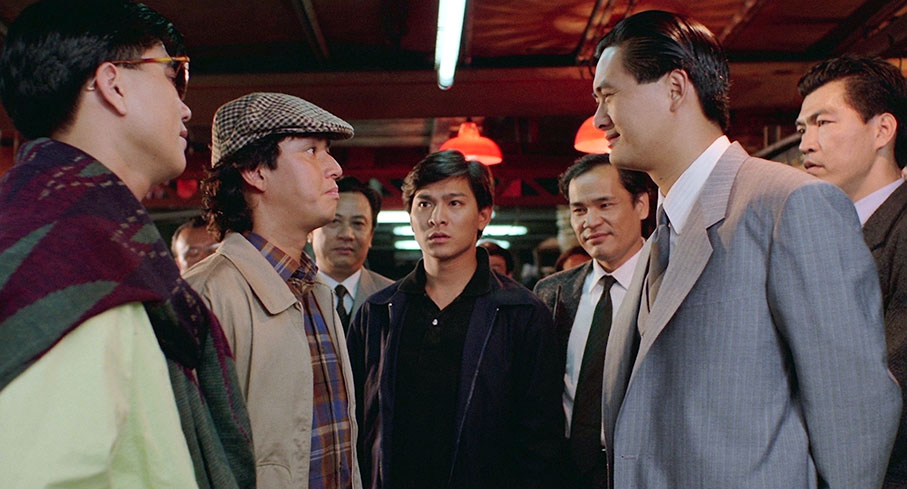
The increasingly strained and ultimately antagonistic relationship between Ting-kwok and Kar-yung is at the core of the story that subsequently plays out over the course of this first film and its sequel. Notable on this score is how it affects Ting-kwok's friendship with Ah-chai, one built on mutual respect that is seriously fractured by Kar-yung's increasingly reckless and self-centred behaviour. Ting-kwok even scuppers his own future prospects at one point to protect his brother, despite the fact that Kar-yung's over-confidence and refusal to obey orders nearly resulted in Ting-kwok's death. Relationships play a crucial role here, and include Ah-chai's long-standing friendship with Tit-tau, whose deteriorating health has seen him confined to bed, where he is nursed by the pretty but no-nonsense Lau Bo-yee (Carina Lau), to whom Chai is instantly attracted and quickly romances. Observing this through sad but pragmatic eyes is Wei-chiu, who now works for Ah-chai as a personal assistant and remains loyal to him, in part because she is secretly in love with him, but remains unable to express her true feelings as she watches him fall for and plan to marry another woman.
Although there is a spattering of martial arts action here, it always feels grounded in reality, with the fights in question being as messy and chaotic as you'd expect them to be in real life. People get hurt and bleed from their injuries, and the nominal good guys do not always come out on top. Comparisons have been made – and indeed are made in the special features in this set – to Francis Coppola's Godfather saga, and while the connection is easy to see, there's also a detectable whiff of Sergio Leone's Once Upon a Time in America to some aspects, and even a touch of Brian De Palma's Scarface to the saga's finale. The influence of John Woo's genre-redefining crime thriller A Better Tomorrow of the previous year has been openly admitted by the filmmakers here, and is clearly evident in a scene in the first film in which that film's star comes thundering to the rescue in the back of a vehicle with a gun in each hand, taking down everyone he shoots at in what plays a little like a level on an action-oriented video game. Elsewhere, however, there's a gritty brutality to the violence that still startles today. When Ting-kwok stops a car in which Chu's men are holding the kidnapped Wei-chiu, they convince him stand down not just by holding a knife to Wei-chiu's face as expected, but by stabbing her sharply in the abdomen with one. A desperate Ting-kwok convinces them to take him instead and is driven to Lo-tai's lair, where he is strung up by the neck whilst standing on a huge block of ice that his bare feet are slowly melting. When convinced by a sizeable mob of Tit-tau's men (in a glorious dolly shot reveal) to hand Ting-kwok over to Ah-chai's driver, Lo-tai does so only after pouring a pot of boiling coffee down his prisoner's throat and holding his mouth shut to ensure it thoroughly burns his mouth and throat, then does likewise with a lit cigar stub before ordering his men to beat the already suffering man silly.
These various elements are precision balanced in the first film, with more depth to the drama than the action thriller norm. There's a brief bit of unfortunately dated character comedy built around Ying-hung's nervous stutter, a more engaging sequence that has fun with his hopelessness as a potential debt collector, and some neatly timed and unexpected narrative turns and sudden explosions of furiously staged action. It builds to a climax where the Godfather influence sees religion and gang violence collide in a well-staged scene of gunfire and chaotic panic, albeit one that had me wondering why two supposedly professional assassins never thought of shooting their target from a distance with rifles instead of running up to them with pistols and immediately exposing themselves to retaliatory gunfire.
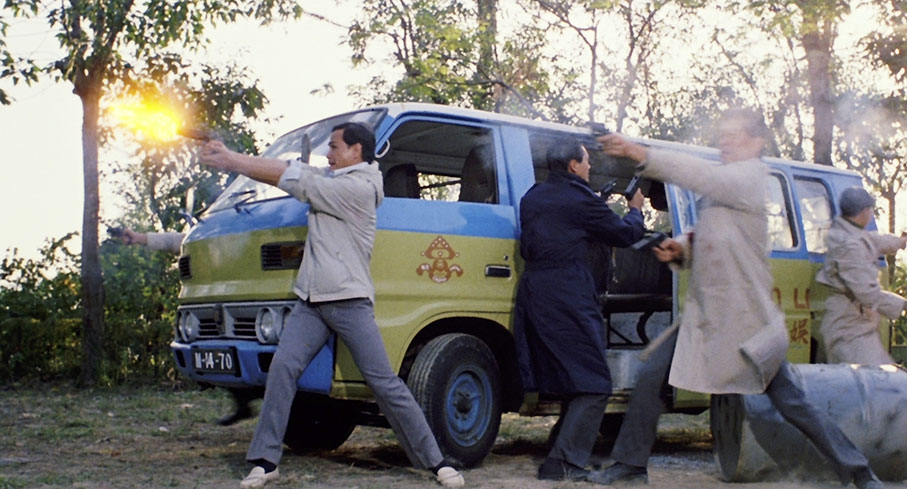
And now… While I'm aiming to keep the spoilers to a minimum, as I state above, any discussion of the plot or characters of Tragic Hero is going to act as a spoiler for Rich and Famous, so if you're new to both films, you might want to skip the next two paragraphs, or click here to do so automatically.
The Part Two aspect of Tragic Hero is established from the off by the fact that the story has moved on a decade since the round-up coda on which Rich and Famous ended. Ting-kwok is initially still out of the picture after his self-imposed exile to Malacca, while Kar-yung has climbed the underworld ladder and is now a direct rival to Ah-chai, whom he has become determined to eradicate. While Rich and Famous charted the personal and criminal career ups and downs of two brothers and their changing relationship with each other and the man they work for, the plot of Tragic Hero is structured more like a chess game, as Ah-chai and Kar-yung alternately make offensive and defensive moves against each other, or in one crucial case have action unknowingly taken against their opponent in their name.
By this point, the difference between Kar-yung and Ting-kwok has been stripped of any of its former subtlety. Ting-kwok has made a happy life for himself in Malacca and dresses like a kindergarten teacher, complete with feature-softening glasses and a beaming smile, and has taken a Malaysian wife and adopted a whole posse of cheerful orphaned children. He's the sort of man you dream your daughter might one day meet and marry. Kar-yung, on the other hand, is now an entitled, drunk-with-power gang-boss who dresses in expensive suits and designer shades, slicks back his hair, and has a cocky entourage of goons to protect him and deal violently with anyone who annoys him. He's the sort of guy you wouldn't want your daughter, your son, or anyone in even your extended family to go anywhere near. Were this a stand-alone film without a prequel – as it technically was for a short while on its initial release – you would swear that Ting-kwok was an innocent being set up to suffer at the hands of the inherently evil Kar-yung. The only character who remains essentially unchanged is Ah-chai, although his position and standing have clearly been impacted by Kar-yung's rise to power and his unwavering determination to take his rival down.
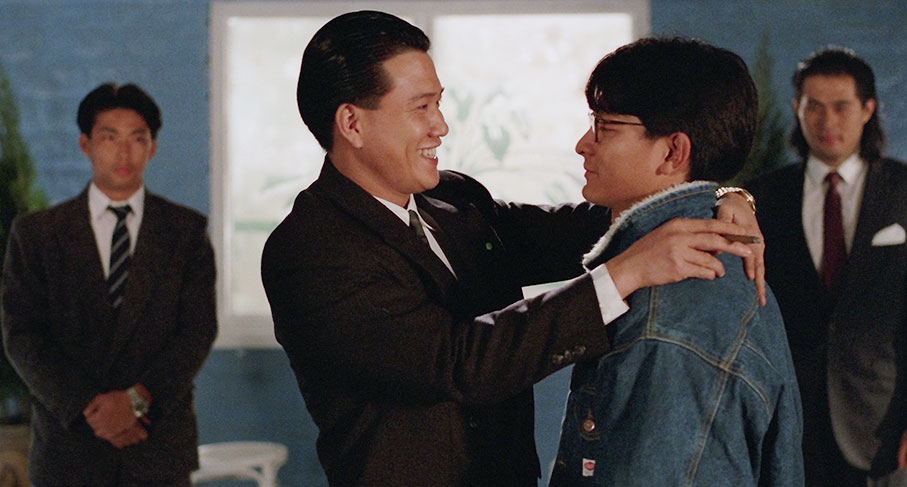
These characters – particularly given the backstories that shape them in the first film – do inevitably create certain expectations for anyone with a few Hong Kong crime dramas under their belt. It seems inevitable, for instance, that something will draw the seemingly retired Ting-kwok back into the fray for a showdown with his brother. There's also a damn good chance that Ah-chai and Ting-kwok will put their past differences aside and renew their friendship, and perhaps even team up to bring about Yung's inevitable demise. What remains teasingly and tensely uncertain right up until the final moments is whether any of the main characters will make it out alive, and given the violence inflicted on them in the first movie, I'm including wives and sisters here.
Driven by pragmatic commercialism though the decision may have been, I really like the fact that what was planned as a single film ended up as two, and while they were ultimately completed and released in reverse chronological order, this did result in the dramatic elements and even some the action of the first film expanded and enhanced from what would have been had it been the first to be released. Both films have their share of explosive action scenes, but it's in the second half of Tragic Hero that the influence of A Better Tomorrow is most keenly felt, notably in a climax that goes full Heroic Bloodshed on us, complete with two bothers-in-arms going up against small army of gunmen, slow-motion explosions and intimidating walks to camera, two-handed gunplay, and an absolute hailstorm of gunfire and squib hits.
The cast is a serious draw here and a key contributor to the box-office success of both films on home turf. As Ting-kwok, Andy Lau effortlessly exudes a sense of decency and fair play even when involved in criminal activity, and when later seen casually dressed and spectacled with his new family, it's hard to imagine him ever lifting a hand against anyone. Boy, does that change. Alex Man probably has the hardest job here as Kar-yung, required as he is to morph from likeably roguish to frustratingly impulsive and then all the way to near-supervillain evil without overstepping the mark – he does come close a couple of times, but in a way that is very much in the tradition of Hong Kong crime cinema bad guys. Alan Tam was apparently such a big star at the time that his role as the stuttering and eager-to-impress Ying-hung is credited in the special features for making Rich and Famous and even bigger box-office success than Tragic Hero. He is engaging here, notably when he returns to the story later having gained oodles of self-confidence and made a career for himself as an insurance salesman, still keen to prove himself in the criminal world and emerging as the sort of friend that we all hope we'd have at a time of personal crisis. Carina Lau is both charming and pleasingly self-assured as Bo-yee, taking no crap at all from Ah-ching when he visits the unwell Tit-tau, and Pauline Wong holds her own as she's put through the wringer emotionally and physically as Wei-chiu. The Killer and City on Fire co-star Danny Lee, meanwhile, has almost a cameo role as Inspector Cheung, a hard-nosed cop who remains determined to take Chai and his criminal empire down, and whose hairstyle seems to change every time he pops back into the story. There is also some stout work in the supporting cast, notably Ko Chun-hsiung as bald-headed rival boss Chu Lo-tai, and Shing Fui-on as Chai's most loyal operative, Luk. But just about stealing the film from his very first appearance is Chow Yun-fat as Lee Ah-Chai, not because he out-acts the likes of Lau, Man or Tam – although he really comes close – but because he's so goddamned effortlessly cool. From the moment we first see him being entertained by Tit-tau, he comes across as a natural charmer, a man around whom trustworthy people would just want to gravitate. Chow also impressively underplays a role that could so easily have leaned into character cliché, displaying a level of easy control and confidence that makes his later outburst of anger and moments of despair all the more startling.
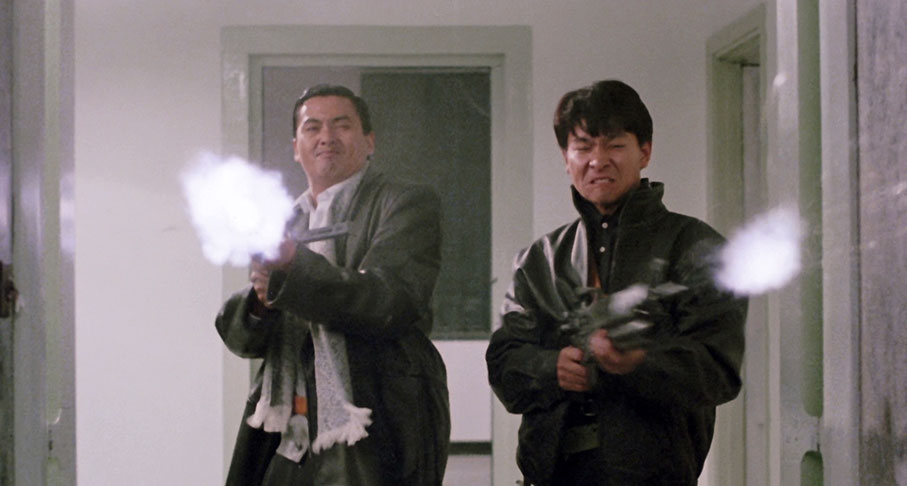
For all the many strengths of the two films, the tonally different influences of The Godfather and A Better Tomorrow do make for a sometimes odd mismatch, with the brutal realism of the early scenes giving way to action sequences where machine-guns and pistols appear to have an endless supply of bullets that hit every target they're shot at despite being fired from the hip without taking anything approaching proper aim. Injuries that would incapacitate and lead to potentially fatal blood loss are brushed off when the need to urgently flee arises, and do not prevent those afflicted from occasionally taking action that borders on the superhuman. And then there's the process work used to add artificial muzzle flashes added to guns in post-production, a tolerable bit of fakery that only falls flat when also applied to bullet hits on victims. Apparently this was done to disguise blood-filled squib bursts that would have resulted in censorship problems in some territories, and while I do understand that, the only way a bullet would produce a fiery spark when hitting a body is if the victim was wearing metallic armour under their clothing.
But these are minor gripes that fail to seriously impact this well-constructed, smartly directed and immensely enjoyable two-part crime drama whose excellent star cast is worth the price of admission alone. Spreading the story over two films allows the sort of character arcs and attention to detail not common in regular feature-length Hong Kong crime cinema and helps give it the feel of a saga along the lines of the American gangster films that helped to inspire it. Despite this, it retains a distinctly Hong Kong flavour, not just because of its cast and locale, but through its economical storytelling, its waste-free direction, it's breezy pacing, and its sheer sense of style.
The result of new restorations from the original film elements (I don't have any more specifics than this), the 1080p transfers of both films – which are presented on separate discs to maximise the bitrate – are absolutely first class. The contrast is very well balanced, with solid black levels, well-defined highlights and a generous range between them, while the colour has a welcome naturalistic feel, with brighter hues most attractively rendered. A couple of the sunlit daylight scenes in Tragic Hero look immaculate. There's not a trace of dust or damage, the image sits rock solid in the 1.85:1 frame, and a fine film grain is visible throughout. An excellent job.
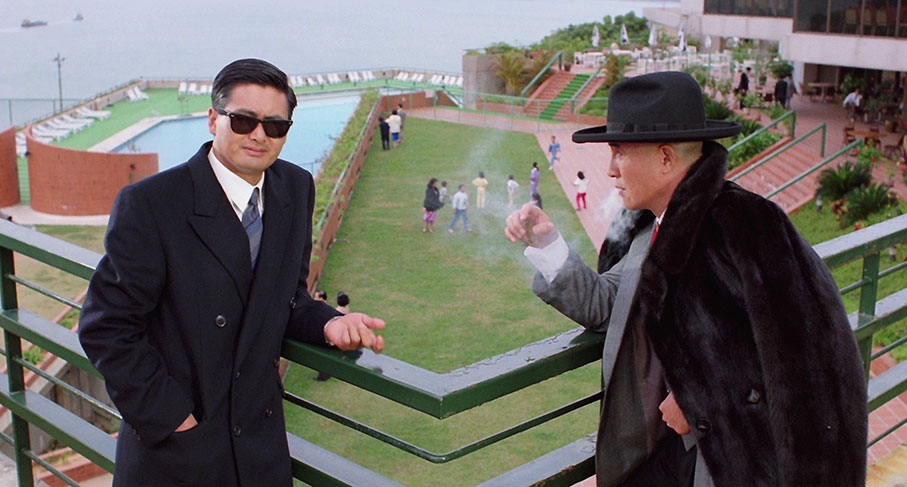
Both films offer three soundtrack choices, the original Cantonese mono, the Cantonese mono track restored, and the English mono dub, all presented as Linear PCM 2.0. The restored Cantonese track is obviously the way to go, as the dubbing is a far better match to the actors' line delivery, and while the original mono is sonically a little rougher, the difference between that and the restored version is not as dramatic as you might expect. The English dub is a decidedly mixed affair, with some characters barking their lines urgently instead of the manner of normal speech, but the replacement English voices for Chow Yun-fat and Andy Lau are more restrained and appropriate for their characters. Interestingly, there's a moment in Tragic Hero when Ah-chai is in a police van and an irritated Kar-yung throws a cigar at him from a passing car, and Ah-chai responds by mouthing a silent curse, which on the English dub has been filled in for the audience with "You fucking bastard!"
Optional English subtitles kick on by default when either of the Cantonese tracks are selected on both films. Switching this on whilst playing the English dub provides a good illustration of how the original Cantonese dialogue has to be altered in translation to come close to matching the mouth movements of the actors.
RICH AND FAMOUS
Audio Commentary by Frank Djeng
Asian cinema expert Frank Djeng reveals up front that he'll be talking about both films here, hence the absence of the initially promised commentary on Tragic Hero, a film you should thus definitely also watch before listening to this. With just 104 minutes to discuss two movies, Djeng ups the speed of his delivery to a sometimes bewildering pace, which occasionally left me struggling to catch exactly what was said when discussing Chinese names or words with which I was previously unfamiliar. You certainly get your money's worth here, with a huge amount of information delivered on the films, the filmmakers, the locations, and especially the actors, as well as details on the use of a specific dialect, and assurance that the subtitle translation of 'motherfucker' during the gang boss meeting is accurate. It's here that I first learned that Tragic Hero was released four months before Rich and Famous, and that Alan Tam's character in the prequel was created to expand that film's storyline and that his scenes were shot in just three days. So seamlessly are they integrated into the already filmed footage that you'd never realise this without being told.
Dub Masters Documentary (21:19)
A short documentary on the work of the Hong Kong based voice actors who dub the English language tracks on Hong Kong genre movies and Japanese anime, one built around interviews with Russell Wait and Simon Broad, two performers with extensive experience in this field. A mix of the anecdotal and the factually informative, it doesn't delve too deep but still covers plenty of ground and proves engaging and enlightening viewing. The end credits reveal that it was produced by Mike Leeder, and was shot, directed, edited and scored by Arne Venema, two names that fans of Hong Kong action cinema should be familiar with by now from their always lively commentaries on UK Blu-ray releases of martial arts movies.
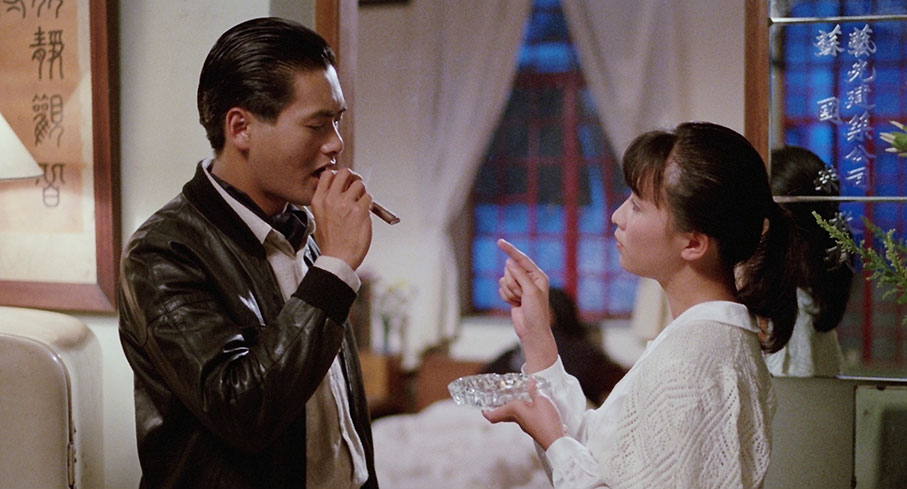
Hong Kong Theatrical Trailer (3:56)
An odd little trailer that begins with some cheerful behind-the-scenes larking around before switching to a montage of shots from the film, which play out silently over music tracks. This ends up communicating little about the film's story or characters, but still manages to include a couple of whopping great spoilers.
English Export Trailer (3:59)
Bloody hell, what is it with these trailer makers and the spoilers? I kid you not, this one opens with a sequence from the climax that you should definitely not see before watching the film for the first time. Another similarly beefy spoiler soon follows, one that also features in the domestic trailer above, but at least we get a little bit of narration here, plus a brief taste of what sounds like a particularly rough English dub.
TRAGIC HERO
Heroes and Villains Johnny Mak Style: Interview with Manfred Wong (22:03)
Energetically enthusiastic co-screenwriter of both films, Manfred Wong, recalls in very specific detail his entry into the Hong Kong television and film industry and his progress through it, including working as a regular writer for producer Johnny Mak and assisting director Taylor Wong. He is similarly thorough when asked about how working on Rich and Famous and Tragic Hero, confirming that Tragic Hero was released first and a new character was added to beef up the unused material, which was quickly shaped into the even more successful prequel. Wong is a ball of informative energy, and I get the feeling that a long conversation with him would be hugely enjoyable and littered with interesting anecdotes, but seriously exhausting.
A Race for the Heroes: Interview with Michael Mak (32:46)
'Shadow' director Michael Mak talks about becoming one the key directors for his brother Johnny's film company alongside David Lai and Taylor Wong, all three of whom worked continuously with separate crews for three days and nights to finish shooting the extra scenes for Rich and Famous in time for its planned release. He goes into considerable detail about the early films he and Lai made for Mak, when they would shoot crime action scenes on location without permits, and once even incorporated an accident their staged robbery caused into the narrative. He believes that their use of non-professional actors and insistence on authenticity is what made their films stand out from other Hong Kong crime films of the period, and why they proved hugely popular with the domestic audience. He reveals that the future of a film's distribution was decided by how fast tickets sold for midnight screenings, which apparently could be boisterous affairs – "Their responses were really intense," Mak says of the audiences at these showings, "if they loved the film, they would applaud and cheer the whole way through, otherwise be sure to expect vandalism in the cinema." He confirms the influence of both The Godfather and A Better Tomorrow on young genre filmmakers of the day, reveals why an independent production company like theirs eventually teamed up with a big studio like Golden Harvest, and really seems to have it in for producer and screenwriter Stephen Siu, whom he berates for bragging and claims only joined Johnny Mak Productions because "all the films he produced were really crap." There's plenty more valuable material here.
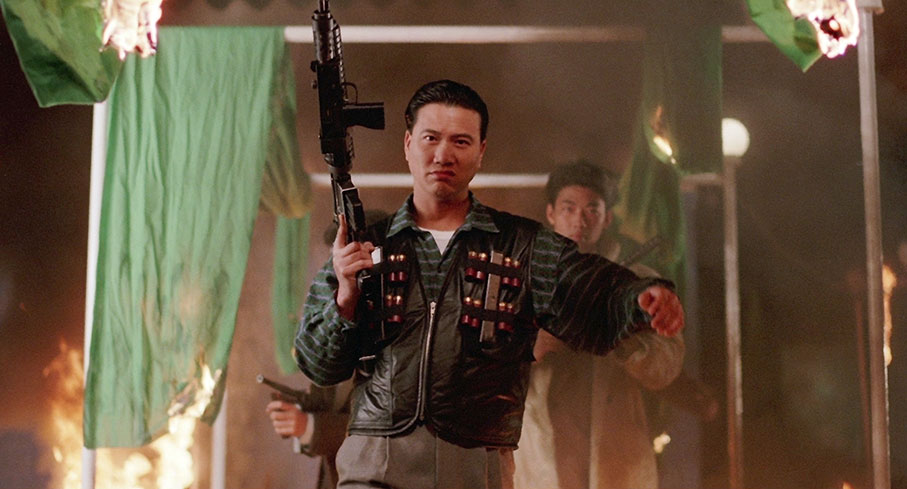
Hong Kong Theatrical Trailer (4:17)
A well-assembled trailer that gives a real flavour of the film's content and action. It does include footage from the climactic scene, but the shots in question are not specific enough to really count as spoilers. Based on this, I'd certainly give the film a look.
English Export Trailer (3:51)
An American release trailer under the title of Black Vengeance and narrated in the manner of those urgently spoken radio newsreel stories of old, which teams up with a dodgy English dub to make it hard to take the film as seriously as we should. "Is anyone safe when Black Vengeance raises its destructive head?" we're asked. Probably not. And in case you were wondering, yes, there are spoilers here.
Also included is a 20-page Booklet, the bulk of which consists of an essay by film critic and historian James Oliver that looks at the two movies and their actors and characters. Main credits for the two films are included, as are a generous collection of stills.
A strong double-bill that uses the running time afforded by its two-film structure to flesh out characters and character arcs beyond what a single 100-minute feature would allow, and does so with style and a belter of a cast for its day. A very fine package from Eureka that includes the fastest spoken commentary I can easily recall and some useful interviews, which together provide a ton of information on the making of this crime saga. Warmly recommended.
|